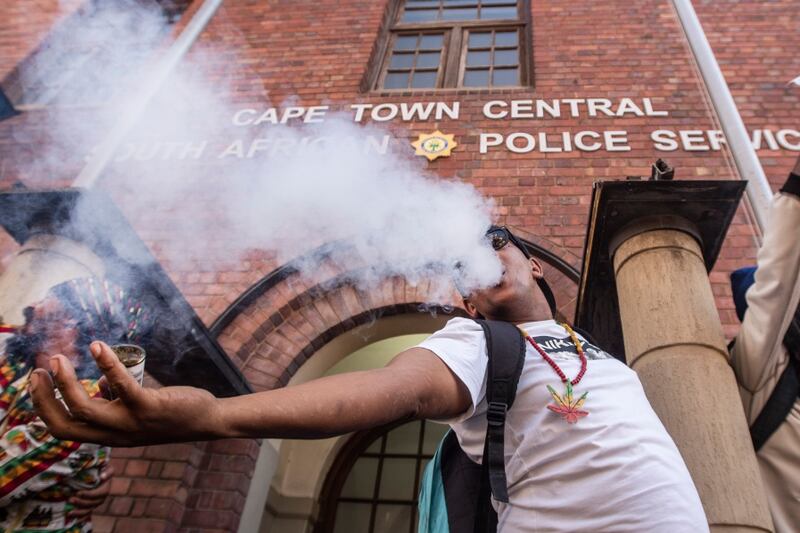Private addiction clinics, with their stained-glass windows and gardens, and dilapidated state hospitals alike are admitting a rising number of young cannabis users, many in the grip of psychotic breakdowns and dependency.
Hallucinations, paranoia and panic are among the symptoms. Registered counsellor Banetsi Mphunga met a man in his early 20s in the Eastern Cape who was forced to suspend his studies in Gauteng because of psychosis. When he returned home early, he was branded a malkop (crazy person).
“He started taking cannabis edibles to tolerate the pain of a pinched nerve. The dosage increased and then he combined it with smoking and ended up with a dependency and psychosis ... This affected his academic performance and family relations,” said Mphunga, who sees cases of dagga dependency in Khayelitsha where he works.
Cannabis has become more freely available since the Constitutional Court legalised it for private use in 2017 — a win in protecting the human rights of vulnerable South Africans — and specially bred strains typically have higher concentrations of the psychoactive cannabinoid THC, the potential trigger for psychosis.
Psychiatrist Laila Paruk, who treats patients at Chris Hani Baragwanath Hospital in Soweto, said cannabis was the most commonly used substance in the community. “The majority of what we treat (at our clinic for mental illness and addiction) is cannabis-induced psychosis or substance-induced psychosis.” Stimulants and alcohol could also induce psychosis.
Cannabis use, particularly by people under 25, can “double the risk of a psychotic disorder”, Paruk warned. “We have good evidence showing cannabis can uncover an underlying predisposition for psychosis, it can worsen an existing psychotic disorder and speed up the symptoms, or it can create a psychotic disorder from scratch.”
Teens admitted with mental illness to the emergency psychiatric unit at Groote Schuur Hospital reported higher cannabis consumption after the landmark Constitutional Court ruling, a UCT study led by Michelle Swartz found.
But prohibition is not the way to make cannabis use safer, most experts indicated in interviews.
Instead of restrictions — as health minister Aaron Motsoaledi attempted with a short-lived ban on cannabis edibles in March — better public education and robust regulations are needed.
Why cannabis risks are higher today than 10 years ago?
What makes marijuana different today from the weed that hippies smoked in the 1960s? The concentration of THC is typically far higher, owing to advanced cultivation methods and selective breeding for greater potency.
“The content of weed today is not like 20 years ago when people bought it from the guy at the garage. It is a heavy drug,” said psychologist Dan Wolf, the director of Houghton House Drug and Rehabilitation Centre in Johannesburg. Cannabis-induced psychosis is becoming more frequent and is “tragic and frightening” for those affected, he said.
US data published by the National Institute on Drug Abuse reflects this trend. A 2024 report showed that the concentration of THC in seized cannabis rose from 3.7% in 1995 to 16% in 2022.
One Cape Town man, whose 20-year-old daughter is in rehab, said: “Before, if someone smoked ‘Durban poison’ they would be high for six hours and that was it. Now you do not know how [potent] it is or what is mixed in with it.”
Adult lifetime prevalence of psychosis is about 0,75% (less than one in 100 people) however a study across 18 countries found that about one in six have had a psychotic experience.
— ADULT PSYCHOSIS PREVALENCE
Most people using cannabis will not suffer a psychotic breakdown, yet dependency is common, said Jeané Coetzee, the clinical manager of Harmony Clinic for Addiction and Psychiatric Care in Cape Town. Addiction is the most severe form of “cannabis-use disorder (CUD)” when people can’t control their habit even when it causes distress and impairment, she said.
A Johannesburg mother, whose daughter went into rehab in her late teens, quit her habit and finished school, said: “Cannabis has become socially acceptable, but it is a misconception that it is harmless and can’t be addictive.”
Cannabis was widely available at her daughter’s high school and social events in the northern suburbs. “A white van would pull up to deliver cannabis at a party or dealers would throw it over the wall,” this woman said.
Cannabis popularity rising, statistics show
Prof Nadine Harker, a senior specialist scientist in the South African Medical Research Council unit that deals with substance abuse, said: “Post the [legalisation], cannabis is becoming more normalised, very much like alcohol is, and more people are using it.” She cited the popularity of hookah pipes.
Harker said “influencers” on social media are among those marketing cannabis products such as edibles in attractive ways to youngsters — often misrepresenting them. Treatment admissions reflected the rising use of cannabis among those under 25.
“Admissions are the tip of the iceberg,” Harker said.
A 2020 study led by UCT’s Henk Temmingh at a Cape Town psychiatric hospital found “anxiety symptoms and suicide attempts were significantly associated” with substance-induced psychosis.
In 2020, 1.5% of the population was using cannabis, rising to 7.8% in 2017, Kennedy Mutai's study into illicit drug use before legalisation found., 1.5% of the population was using cannabis, rising to 7.8% in 2017, Kennedy Mutai's study into illicit drug use before legalisation found.
Cannabis outlets with names such as Cannabliss, Green Supreme and Canna Kingdom have mushroomed, some open 24 hours a day, while delivery services abound for legal and borderline legal products even to teens.
More young people — who live with rising unemployment and conditions such as anxiety — are turning to cannabis for relief, said Tebogo Ramadiro, the substance abuse project co-ordinator for the South African Depression and Monitoring Group (Sadag).
“We get multiple calls about cannabis from young people on our 24-hour helpline. They say they are calling for ‘a friend’ who is smoking heavily and ask about feelings of anxiety, paranoia and hallucinations,” he said.
Clinical psychologist Mark de la Rey, who works at Akeso Kenilworth Clinic in Cape Town, said: “We have over the past five years seen a significant increase in people under 25 presenting with substance-induced psychosis as a direct result of using cannabis. There is also research showing links with cannabis use and onset of schizophrenia where there is a genetic vulnerability to that condition.”
But he said he sees more people who self-medicate with cannabis and other substances — for relief issues such as anxiety, depression and ADHD — than who use it recreationally.
Benefits of CBD & cannabis vs potential harms
Tebogo Tlhopane, chair of Cannabis Trade Association Africa (CTAA), said most cannabis consumers are adults who use it and the non-psychoactive cannabidiol CBD therapeutically for anxiety, sleep, inflammation and chronic pain.
Harker said there is evidence that CBD can help treat nausea, seizures and multiple sclerosis, as well as give cancer patients pain relief.
Hallucinations, delusions and paranoia, severe panic, dread or anxiety, extreme mood swing, cognitive impairment and incoherence, disconnection from reality, disorientation and in some cases aggression are among the symptoms. — National Institute on Drug Abuse
— SYMPTOMS OF PSYCHOSIS
Cannabis exposures reported to the poisons information helpline at the Red Cross War Memorial Children’s Hospital tripled between June 2015 and June 2019. Most cases were accidental exposure by oral ingestion.
Tebogo Somo, a community development worker for the South African National Council on Alcoholism and Drug Dependence in Alexandra, said: “We need to do more prevention in communities to raise awareness about the harm as more and more kids are smoking dagga since it was legalised.”
She flagged the mixing of cannabis with other drugs as a risk to users: “Places in Alex are selling dagga which is laced with other drugs and it is all about making money. They are experimenting with their customers.”
Legalisation a victory for human rights, says cannabis advocate
Leading cannabis advocate Myrtle Clarke, MD of the nonprofit Fields of Green for All, said: “The fact that cannabis gives a very small number of people psychosis is not nearly as important as ending the prohibition in South Africa, where they are still arresting the poorest of the poor. This is a human rights travesty.”
She said she personally smoked weed “all day, every day ... Lots of people use cannabis to cope in their lives and that isn’t acknowledged”.
South Africa needs a “fully fledged cannabis industry to support economic growth and regulations to protect young people”, she said, calling for cannabis to be removed from the Drugs and Drug Trafficking Act.
Tlhopane said the CTAA, which represents more than 260 stakeholders, was participating the development of the government’s cannabis master plan.
The CBD market in wellness and over-the-counter therapeutic products was worth more than R300m annually by 2023, he said.
The CTAA advocates for a framework that “distinguishes clearly between high-THC medicinal cannabis, low-THC wellness products, and industrial-nutritional hemp — supported by mandatory third-party testing and product registration”.
Tlhopane said: “We urge a public health-led, evidence-driven conversation, rather than conflating all cannabis use with high-risk behaviour.”
Carl Beuster, a Cape Town psychiatrist who has treated many patients with cannabis-induced psychosis locally and in the UK, said: “The illness is a burden on individuals but on a societal level the harm from cannabis is nothing compared to alcohol.”
Encourage honest conversations
Besides improved regulation, mental health experts said that psychosocial education, greater awareness of potential risks and open communications were needed.
Sadag would like to see the destigmatisation of support services for people struggling with cannabis, said Ramadiro. “We need to have more honest conversations about cannabis and be kind to young people.”
De la Rey urged parents to have open conversations with their children. “It is important to be aware of what is happening in your child’s life and actually being present in their lives, then they are more likely to speak to you if they are in trouble.
“This is more helpful than attempting to physically stop them from experimenting. Speaking to them more openly about it and listening to their reasons for wanting to use or using it, may be more powerful in the long run than just saying ‘don’t do it’.”





Would you like to comment on this article?
Sign up (it's quick and free) or sign in now.
Please read our Comment Policy before commenting.